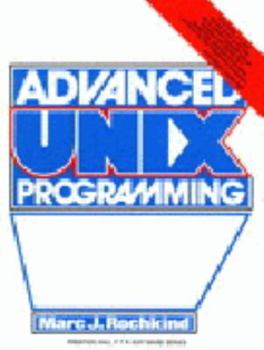Advanced Unix Programming
Select Format
Select Condition 
Book Overview
The changes to UNIX programming that have taken place since 1985 are extensive to say the least. The first edition of Advanced UNIX Programming is still used and considered to be a must have book on... This description may be from another edition of this product.
Format:Hardcover
Language:English
ISBN:0130118001
ISBN13:9780130118004
Release Date:August 1985
Publisher:Prentice Hall
Length:420 Pages
Weight:0.96 lbs.
Dimensions:0.6" x 7.0" x 9.2"
Customer Reviews
5 ratings
Just right
Published by Thriftbooks.com User , 19 years ago
This book starts at the beginning, assumes very little, and takes you quickly to the essentials you need to know about unix. The text is clear but too verbose - you can actually finish this book, which I find important for programmers who want to get a sound introduction and then get to coding. The new edition is updated for modern unix-like systems.
Required Reading for UNIX developers
Published by Thriftbooks.com User , 20 years ago
This book is truly exceptional - it covered the UNIX programming environment from beginning to the end very well. Marc Rochkind has done an amazing job updating his classic book. A brief history of UNIX and a history of various UNIX standards such as POSIX, SUS and pretty much all the others plus a 30 minute crash course in the underlying structure of UNIX get the readers going. If you are anything like me that hasn't as much a thought about how process ID's are used and the creation child processes and how permission plays a role in process creation, you will enjoy this section. I learned that its one thing to "use" UNIX, and another to really understand it deep down. The standards that are out there really throws you off though as there are so many of them. How and which one to choose? It gets rather complicated. Marc spends the first section talking about all the difficulties of "choosing a standard", and then gives you a header file that you can plug into your code and off you go. I was pleased by that. I have already started using that header file in my code and I find it rather useful. Starting from the basics of files and file access, every one of the function calls are depicted in full and example is given for each one of them. This book is like a big "how-to" notebook that one can pick and choose what to read where to get valuable information from as one needs it. Another thing that the author does throughout his book, which made me very happy, was the little tables of "stats comparisons" between the various options and settings that were just discussed. No more guessing games as to what to expect or what to test. It's all right there. I know, for example, that blocked-sized I/O of 512 bytes takes less than a second to complete versus 223 seconds when a character at a time is read. You might think that this information is rather trivial, but do you know the difference in the time that it takes to access data stored in a regular file versus data stored on a raw disk device? Accessing the terminal can get rather complicated with all the options available, and I didn't know was how much more complicated this matter gets due to the relations that terminals have with sessions and process groups. Process group, session leader, process-group leader and the controlling process could make you life as a programmer very difficult if you don't know how they inter-relate. The power of UNIX comes in a box - you have to open it to see inside, but be very prepared before you open up that box. If you have done any network programming if your life, you want to know the details and options that are available to you if you are using "select" or "pselelct". What the timeout options are, and how you can use the "poll" system call to achieve the same task as "select", but more efficiently at times. Threads, Processes and their inner workings are covered extensively in this book, as one would assume. The difference in this author
A must have
Published by Thriftbooks.com User , 20 years ago
I also have the first edition (and a previous book) and am an unabashed fan of Marc Rochkind's.What this book promises and delivers is a catalog and explanation of Unix (including Linux) system calls.The clarity with which it is done is a thing of beauty. It is much more dense and extensive than the 1st edition.After all, a few things have happened in the interim.:)This is where Unix comes alive.
Covers System calls indepth, a must for hardcore unix fans.
Published by Thriftbooks.com User , 25 years ago
A very rare book with useful information about unix system calls, helps you acquire indepth knowledge about interprocess communication and unix file management system. Great book for advanced unix and c programmers.
A must-have for understanding Interprocess Communication
Published by Thriftbooks.com User , 25 years ago
An excellent book for people who want to understand and program under UNIX operating system. The author has done a wonderful job by building a set of library routines for interprocess communication (IPC) and shown the merits, de-merits and highlighted the usefulness of available system calls.Use it alongwith Stevens' "Advanced UNIX programming" book.





